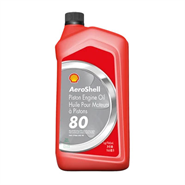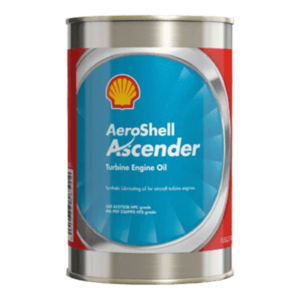AeroShell Ascender
AeroShell Ascender combines low coking, high performance synthetic hindered ester basestock with advanced additives for superior thermal and oxidation stability and excellent elastomer compatibility.

Features and benefits
Excellent elastomer seal compatibility
Low coking performance
Outstanding TAN (total acid number) stability
Enhanced viscosity stability
A ‘High Performance Capability’ grade oil
Specifications & approvals
| Country | Specification |
|---|---|
| SAE | SAE AS5780D Grade HPC |
| United States | MIL-PRF-23699G Grade HTS |
| British | DEF STAN 91-101 equivalent |
| French | DCSEA 299/A equivalent |
| NATO Code | O-154 equivalent |
| Joint Service Designation | OX-27 equivalent |
The TDS and MSDS are in English, but you can find these documents for other countries in the Shell EPC area
Applications
AeroShell Ascender was developed for the latest generation of gas turbine engines as a low-coking, high compatibility product. Its improved thermal and oxidative stability will ensure negligible coke formation in engines. It has also been tested extensively for elastomer compatibility, which is a known service problem. AeroShell Ascender therefore offers the customer the balance of low coking performance with excellent elastomer compatibility.
AeroShell Ascender will also deliver performance benefits in today’s existing high powered, high compression engines in which the older generation of oils can be stressed up to and beyond their thermal limits, as evidenced by oil coking in the high temperature bearing areas.
Health, Safety and Environment
Health and Safety
- This product is unlikely to present any significant health or safety hazard when properly used in the recommended application and good standards of personal hygiene are maintained.
- Avoid contact with skin. Use impervious gloves with used oil. After skin contact, wash immediately with soap and water.
- Guidance on Health and Safety is available on the appropriate Material Safety Data Sheet, which can be obtained from your Shell representative.
Protect the Environment
- Take used oil to an authorised collection point. Do not discharge into drains, soil or water.
Additional information
Advice
- Advice on applications not covered here may be obtained from your Shell representative.
Get in touch with us
We’re here to assist you with any inquiries or support you may need
Typical Physical Characteristics
| Properties | Method | SAE AS5780D Grade HPC | Typical |
|---|---|---|---|
| Oil Type | - | Synthetic ester | Synthetic ester |
| Kinematic viscosity @ 100°C mm²/s | ASTM D445 | 4.90 to 5.40 | 5.02 |
| Kinematic viscosity @ 40°C mm²/s | ASTM D445 | 23.0 min | 25.77 |
| Kinematic viscosity @ -40°C mm²/s | ASTM D2532 | 13 000 max | <12 000 |
| Flashpoint (COC)°C | ASTM D92 | 246 min | 266 |
| Pourpoint °C | ASTM D97 | -54 max | <-54 |
| Total Acidity mgKOH/g | SAE-ARP-5088 | 1.0 max | 0.26 |
| Evaporation loss 6.5 hrs @ 204°C %m | ASTM D972 | 10 max | 2 |
| Foaming tendency | ASTM D892 | Must pass | Passes |
| Swelling of standard synthetic rubber, SAE-AMS 3217/4, 72 hrs @ 204°C, swell % | FED-STD-791 M.3604 | 5 to 25 | 16.24 |
| Elastomer compatibility, % weight change after 24/120 hrs: Fluorocarbon, @ 200°C | DEF STAN 05-50 M.22 | 11/15 max | Passes |
| Elastomer compatibility, % weight change after 24/120 hrs: LCS Fluorocarbon, @ 200°C | DEF STAN 05-50 M.22 | 12/20 max | Passes |
| Elastomer compatibility, % weight change after 24/120 hrs: Nitrile, @ 130°C | DEF STAN 05-50 M.22 | 19/19.5 max | Passes |
| Elastomer compatibility, % weight change after 24/120 hrs: Silicone, @ 175°C | DEF STAN 05-50 M.22 | 14.5/14.5 max | Passes |
| Elastomer compatibility, % weight change after 24/120 hrs: Perfluoroelastomer, @ 200°C | DEF STAN 05-50 M.22 | 2/2 max | Passes |
| Thermal Stability / Corrosivity, 96 hrs - metal weight change, mg/cm² | FED-STD-791 M.3411 | ±4.0 max | Passes |
| Thermal Stability / Corrosivity,96 hrs - viscosity change, % | FED-STD-791 M.3411 | ±5.0 max | 0.2 |
| Thermal Stability / Corrosivity, 96 hrs - Total Acid Number Change, mgKOH/g | FED-STD-791 M.3411 | 6.0 max | 1.4 |
| Corrosion and oxidation stability, 72 hrs @ 175°C | ASTM D4636 - Alternate Proc.2 | Must pass | Passes |
| Corrosion and oxidation stability, 72 hrs @ 204°C | ASTM D4636 - Alternate Proc.2 | Must pass | Passes |
| Corrosion and oxidation stability, 72 hrs @ 218°C | ASTM D4636 - Alternate Proc.2 | Must pass | Passes |
| Ryder gear test, relative rating, Hercolube A, % | FED-STD791 M.6508 | 102 min | Passes |
| Bearing test rig Type 1½ conditions, Overall deposit demerit rating, 200 hrs | FED-STD791 M.3410 | 40 max | Passes |
| Bearing test rig Type 1½ conditions, Viscosity change @ 40°C, % | FED-STD791 M.3410 | 0 to +35 | Passes |
| Bearing test rig Type 1½ conditions, Total acid number change, mgKOH/g | FED-STD791 M.3410 | 2.0 max | Passes |
| Bearing test rig Type 1½ conditions, Filter deposits, g | FED-STD791 M.3410 | 1.5 max | Passes |
| HLPS dynamic coking 20hrs @ 375°C Deposit, mg | SAE-ARP-5996 | 0.4 max | 0.15 |
| HLPS dynamic coking 40hrs @ 375°C Deposit, mg | SAE-ARP5996 | 0.6 max | 0.32 |
| Sonic Shear stability - viscosity change @ 40°C, % | ASTM D 2603 | 4 max | 0 |
| Trace metal content | ASTM D5185 or D6595 | Must pass | Passes |
| Sediment mg/l | FED-STD 791 M.3010 | Must pass | Passes |



